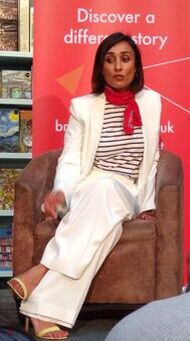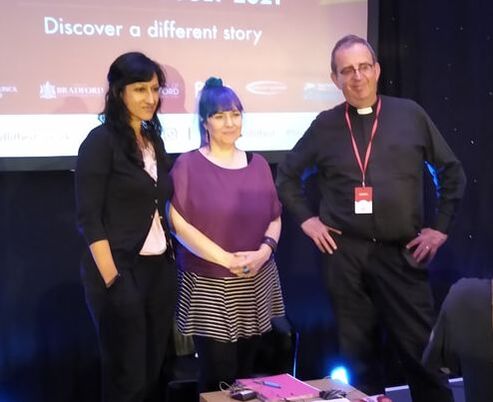This year – as a result of the general uncertainty and a lack of organisation on my part – I attended only two events. But what this year’s festival lacked (from my point of view) in quantity, it certainly made up for in quality.
Anita Rani
|
On a recent Saturday evening I sat in the splendour of the Bradford branch of Waterstones – surely one of the UK’s most stunning bookshops – listening to a conversation between writer Saima Mir and Anita Rani. Anita is a household name thanks to her TV and radio appearances on shows such as Strictly Come Dancing, Countryfile and Woman’s Hour, to name but a few. On this occasion she cut a luminous figure in her tailored white trouser suit, and began by proclaiming her love for Bradford, the city in which she was born and raised.
|
|
Anita talked to Saima about her book, The Right Sort of Girl, which she wrote in lockdown. She reflected on her upbringing, describing the clothing business her family had set up in Bradford and the experiences of the women who worked there. Her own experience helping out on a market stall had, she said, given her a lot of confidence, something that had helped in her career.
|
Many of Anita’s reflections also touched on the personal sphere. She talked about food, family and weddings. She talked about how South Asian girls were mostly not encouraged to speak up, except on the topic of beauty. And she wondered how much the lives of women (particularly those from South Asian backgrounds) have changed since she was growing up.This was an entertaining and thought-provoking discussion. Anita’s book is now on my reading list.
Rev. Richard Coles and Arifa Akba
Richard and Arifa each reflected on what had helped them to deal with the grief they felt. As a widow, Richard didn’t appreciate being told by others how he should be feeling and behaving, but did value conversations with other widows who told him how they themselves had felt/behaved, without giving advice. Meanwhile, Arifa noted that the loss of a sibling isn’t as widely recognised as the loss of a spouse is, something that left her feeling rather adrift. Coincidentally, two of her close friends had also lost siblings, so Arifa was able to discuss her feelings with them.
The two authors also discussed addiction and attitudes to it. David’s alcoholism wasn’t public knowledge, so many were shocked by his death. Richard described the strain of living with and caring for an addict: he often went without sleep so that he could make sure David was safe. Arifa described the complex issues associated with her sister’s eating disorder – a type of addiction – including the shocking negative comments made by a member of medical staff.
Arifa and Richard touched on the way in which grief had affected their relationship with art and music, respectively. Fauzia was an artist who had created striking paintings and embroidered art. She had been deeply affected and inspired by the Sistine Chapel, leading Arifa to visit the Vatican after her sister’s death to share that experience and feel a connection with Fauzia. Richard and David had played music together, so Richard had avoided revisiting their shared music after David’s death because it was just too painful. Instead, he had decided to learn to play a new instrument: the accordion.




